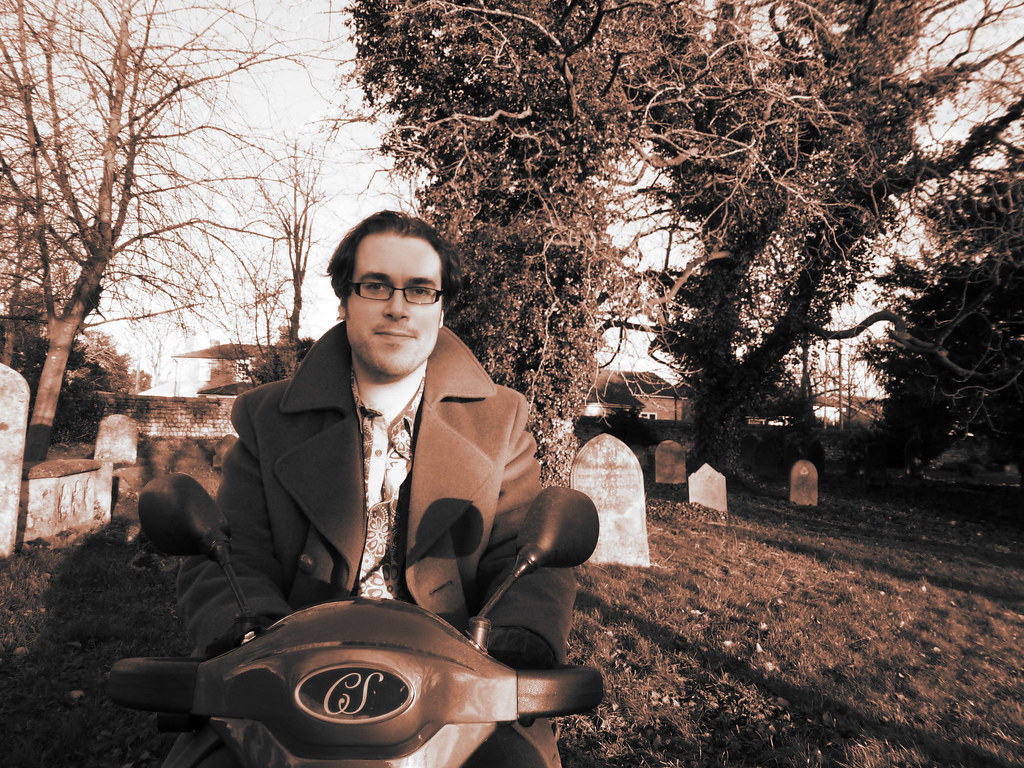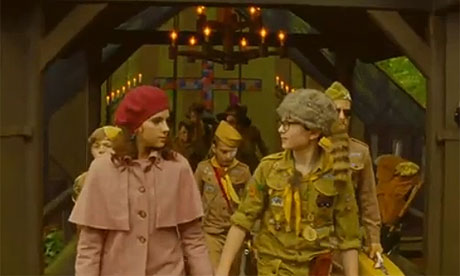Download an MP3

Deb and I have tried to get out of the house a little more this year. This has meant that every few weeks you might see us in convoy along the pavement, her in the lead on her wheelchair while I take up the rear on my scooter. I’d like to think that this was entirely due to her wheelchair being fractionally slower than my scooter and so it making more sense to keep to her pace. I fear, however, that I am actually one of nature’s followers. I prefer to be back a ways, watching others out in front. And Deb has pretty hair - I get to see it blowing about in the wind if I’m behind her.
Every now and then we’ll draw level where the pavement is wide enough. If it’s somewhere very quiet, we might go along holding hands (occasionally leading to a very low speed collision).
Every now and then we also get comments. Any mobility equipment user will know the kind of thing. “Cor, can I hop on for a lift!” “Have you got a license for that thing?!” and, most recently “I guess one of the good things about being disabled is not having to walk in cat s**t...”. I s**t you not...
Obviously, most of the comments aren’t meant in a terrible way. Often it’s people, a little surprised by what they’ve seen, wanting to be friendly. And when people want to be friendly at something they are surprised by, that friendliness often falls flat. What’s more, in a society where disabled people are increasingly persecuted, any reference to any part of your disability can feel like an attack.
And yet, I remember as a kid being so totally bowled over by how brilliant scooters were. There was a chap down the road who had one with a great big plastic canopy, and on rainy days it looked like a comfy little tent on wheels. And I don’t think that’s changed much - the other day we happened upon a pair of young boys being mischievous in the woods after school. A bit shocked at being found, their response was “That’s an electric wheelchair! Cooool!”
These things should be cool. And so I’d like to tell you a story.
The other day, you’ll never guess who I met. Go on, guess! You’ll never get it. But go on, give it a go anyway!
No, it wasn’t Nick Lowe, the Classics scholar and writer of Mutant Popcorn film reviews in the SF magazine Interzone. But good guess.
It was actually the former head of engineering from Karelma scooters!
Yeah, I know.
Long ago, I myself had a Karelma scooter. It was the first scooter I bought - a second hand blue-green Karelma Pegasus. Sadly, I began to have problems with it around the time when the company disappeared, and so I sold it and bought myself a Pride Legend XL in black.
At the moment, we’re in a bit of a funny situation, living between our parents. We’re trying to arrange something for our housing in the future, but in the mean time transporting a scooter between two houses would have been very difficult. I was very lucky to receive a scooter for free from the widow of a colleague of my father. So, for a time, we were actually a two scooter household. This CS200 was a fairly old machine. It had scratches along the side (and, rather suspiciously, came complete with a bottle opener on the keys...) but served me very well. It started to have problems and Deb’s wheelchair is also getting a little decrepit. So we decided to get them serviced.
Me sat on a CS200 mobility scooter in a slightly wintery graveyard. Prescient for the fate of the scooter, alas...
And that’s how I came to meet the former head of engineering from Karelma scooters!
Disability in general, but particularly chronic invisible conditions can be extremely damaging to a chap’s sense of masculinity. Look for a male disabled role-model and you’re either looking at a pirate, super-soldier or bond villain. All of them are active, hyper masculine and...well, not ever such a lot like me. They also tend not to have anything to do with mobility scooters. Electric wheelchairs are OK for villains (and also Tim Mcinnerny in Johnny English Reborn) but on the whole, you’re expected to be propelled by the musky force of your manliness alone. Or, you know, your arms.
A still from Johnny English Reborn - a surprisingly fun film featuring an improbable mobility device.
But do you know what happened when I spoke to the former head of engineering from Karelma scooters (who, for the record, is called Artur)?
We had a wonderfully blokey conversation!
We talked about the amperage of the motor controllers. We talked about the benefits of dual motors over trans-axle designs. We talked about the cost of parts and engineering philosophies.
Honestly, I couldn’t have felt more manly without the aid of a full set of spanners and a two gallons of used engine oil!
And what’s more, I felt pride in that manliness.
Two points relating to this;
1.) Pride is currently not encouraged for disabled people in our society. Our image, as portrayed by politicians and in the media, is one of which no one could be proud. We must be lacking everything - any sort of capacity, any sort of happiness or fulfillment - to be entitled to any sort of help (and, indeed, any sort of acceptance in society). If we receive help, we cannot show anything good for fear of that help being taken away. This means that our communities tend towards copious displays of lack of ability to justify ourselves.
2.) I don’t want you to believe for an instant that I mean manliness in a way that excludes women. I think all women should be a little manly. There’s something wonderfully nerdy about being a chap. We watched a programme the other day about men in Georgian Britain and it mentioned how men didn’t have fripperies or toys, they had ‘equipment’. Everyone should be able to have equipment! Equipment is fun! And one of the best things that manliness gives you is a certain self confidence...and an enthusiasm.
The problem with men (or at least one of the many problems...) is that they can let that go too far the other way. That’s when you get arrogant sods and men who, when seeing a couple out on their mobility equipment is a bit annoyed that they will avoid the fate of his excrement-covered shoes.
So, I urge you all to take some pride in your equipment, whatever it may be, and feel enthused, not just in things, but in yourselves. Me, I will feel pride in my mobility equipment. And I look forward to the time when my scooter needs servicing* as I am sure Artur and I will have a fun conversation about the benefits of single-piece control panels for waterproofing purposes. Just two chaps who, in their own individual ways, are both part of a proud disability community.
--
If you have any problems with your scooter or wheelchair and are in East Anglia, I urge you to give Scootertech a ring. Also, wherever in the country you are, if you’re in the market for a new scooter, you could do a *lot* worse than one of his models. And if you buy one, mention me! With a few hundred commissions, I might be able to get my own Hillclimber Extreme - a name so manly, I think I just heard my chest-hair rustle in excitement!
*Sadly the CS200 had terminal problems and we’re back to being a single scooter household






